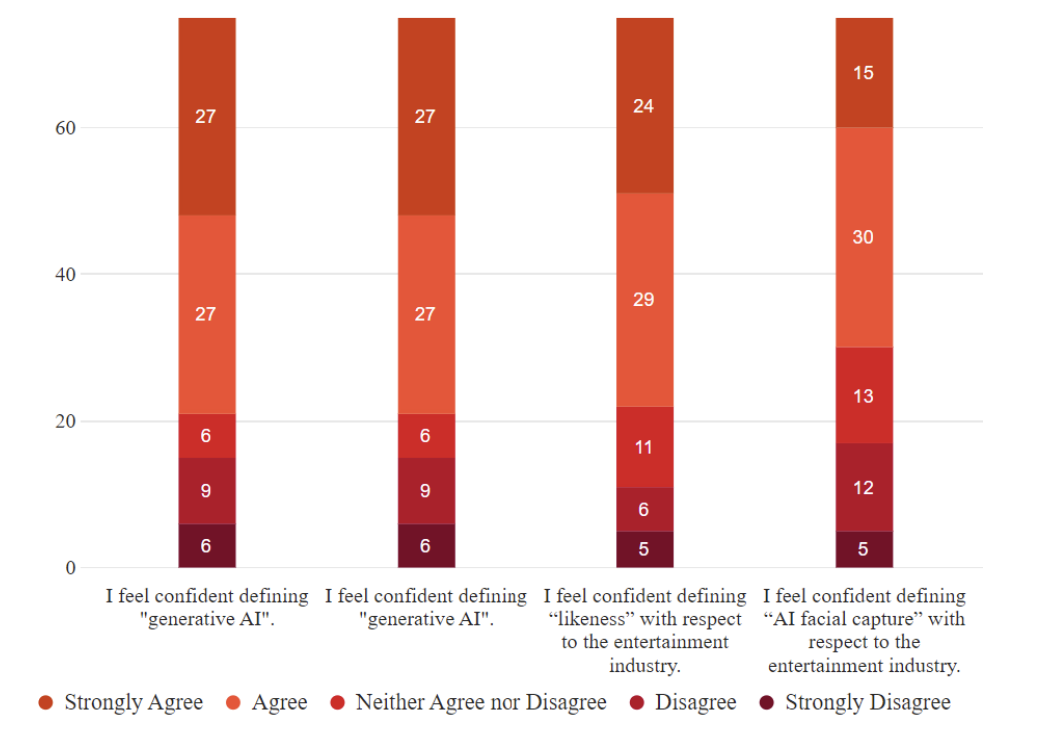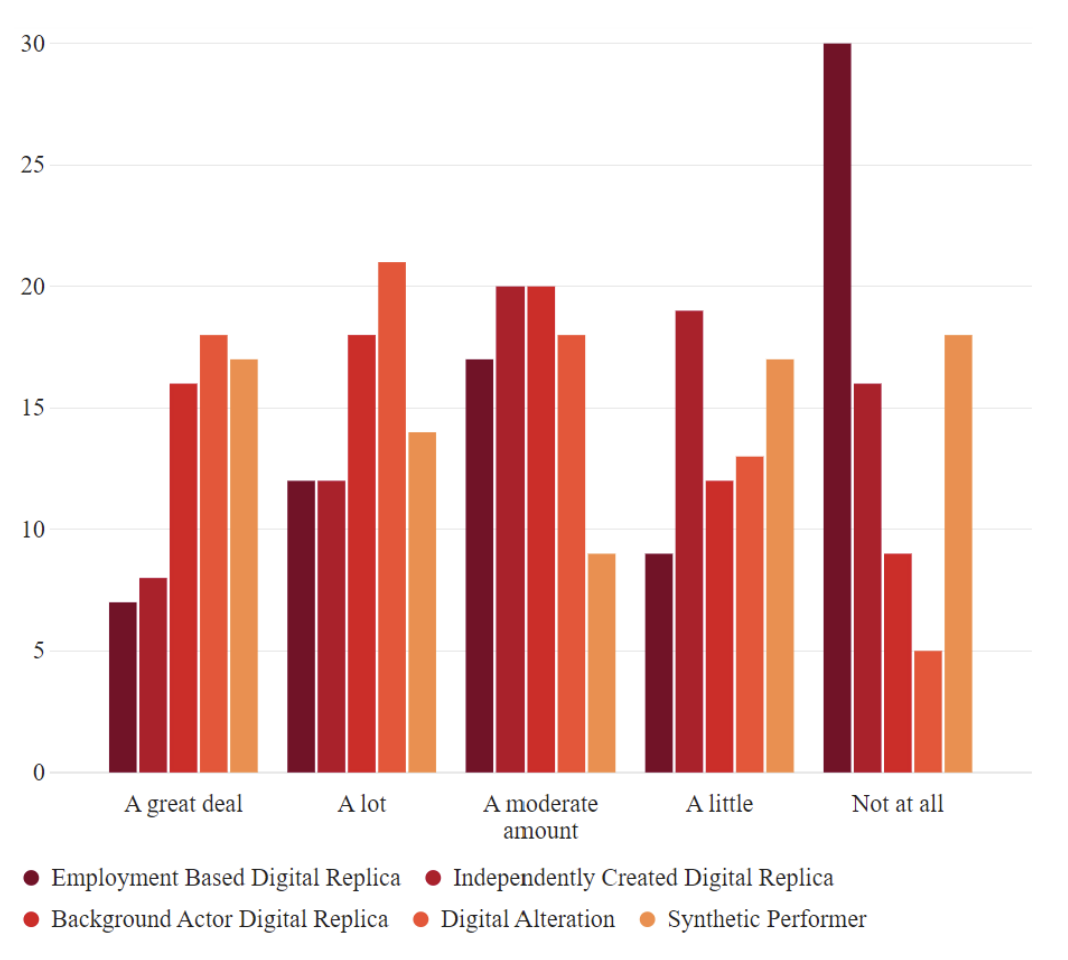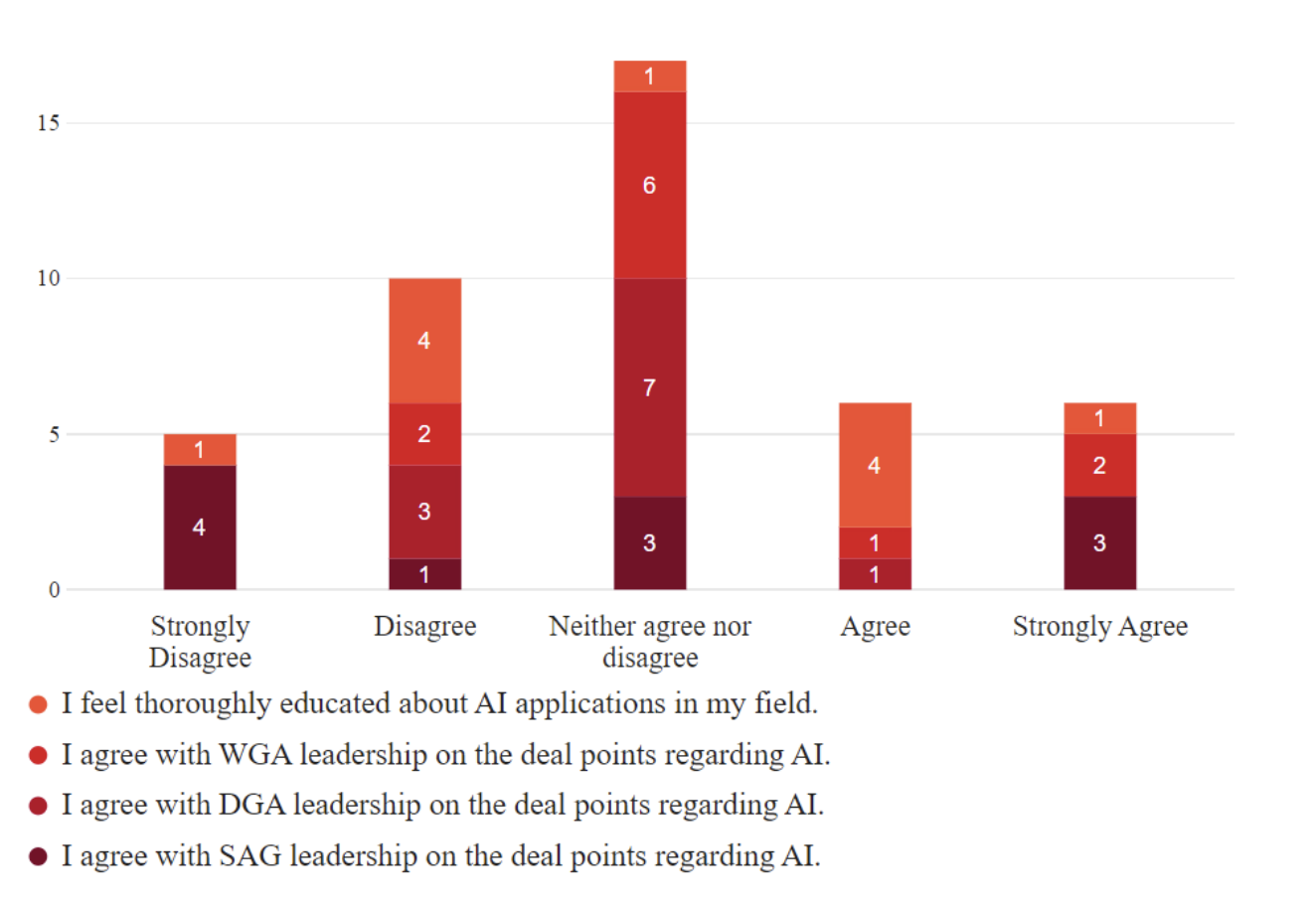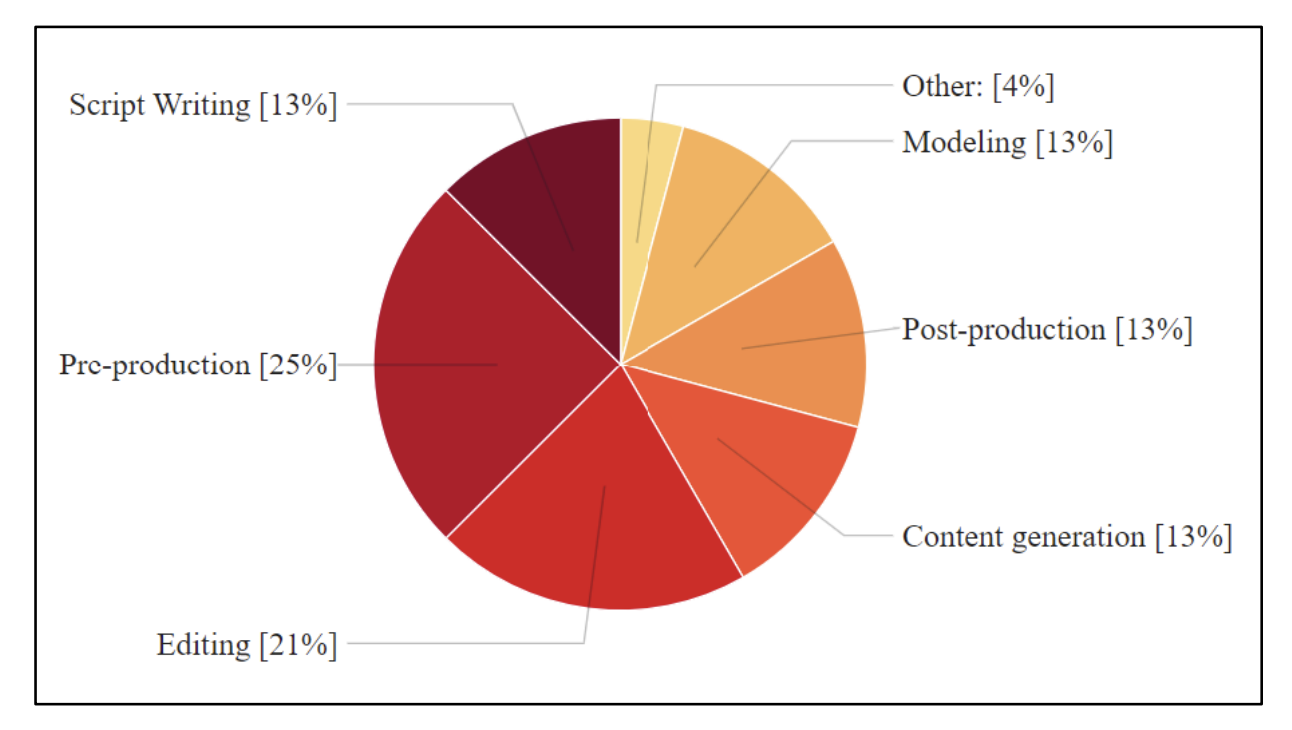By: Averi Allison, Tatiana Behar Russy, Erin Coughenour, Julia Timmons
Image Source: Faceware
How will AI-generated content transform the entertainment industry? And what are the impacts on employment, content development, budgets, contracts, legislation, and privacy rights? In Part I of this research, we shared introduced key concepts and background information about the emerging technology and its use. While AI is used in many areas of filmmaking - from idea development to storyboarding, editing, VFX, and trailers - artists remain skeptical about its impacts. In the summer of 2023, AI usage, consent, and compensation became a major negotiation points for unions like the Writers Guild of America (WGA) and Screen Actors Guild-American Federation of Television and Radio Actors (SAG-AFTRA).
With this background, Part II provides an in-depth analysis of our team’s survey and interviews provided by entertainment lawyers, educators, and other industry professionals. This primary research serves to get a deeper understanding of the current state of AI use cases in the industry through the perspective of key stakeholders.
Over a third of survey respondents (39%) identified as working in the entertainment industry. Of these respondents, 65% felt confident in defining fundamental AI-related terms such as ‘Generative AI’ and ‘Likeness.’ However, when looking at more specific terms, such as the various types of digital replicas outlined in the 2023 TV/Theatrical Contract between SAG AFTRA and the AMPTP, between 74% - 85% of industry professionals said they were not familiar with these terms. Actors and writers showed a general neutrality towards the deal points regarding AI in the new contracts. This sentiment could be attributed to a lack of knowledge on the newly outlined terms. Producers and studio executives were asked if and how AI is being used in productions. Seventy-three percent of producer respondents said that AI would be a worthwhile investment for company growth. 100% of respondents predicted they would use at least one type of digital replica in future productions. Overall, survey responses indicated that the market for AI in TV and film - especially used to create digital replicas - will significantly increase over time, as studios will likely invest in this technology in the near future.
A number of interviews were conducted with industry experts. While many interviewees expressed that they were not experts on AI, their knowledge and experience in the entertainment industry provides valuable insight on realistic applications of AI in entertainment. All interview subjects expressed confidence that AI has a place in the entertainment industry. However, a SAG-AFTRA member indicated that many actors are still fearful of AI technology, which is likely to be a significant roadblock in implementation.
Survey
The survey focused on gaining producer, actor, and consumer perspectives on AI in film and television. By having respondents self-select their profession at the start of the survey, we provided customization by asking different sets of questions dependent on what profession the respondents identify with. Our survey was open from February 5, 2024 to April 20, 2024, collecting 198 survey completions.
Demographics:
Out of the total respondents, 39% work in the entertainment industry, 61% are general consumers, and 30% are between the ages of 45 and 54. Of the 198 that completed the survey, 141 identified as female, 52 identified as male, 3 identified as non-binary, and 2 preferred not to say. Out of the 83 respondents who currently work in the entertainment industry, 20 respondents are producers or studio executives (24%), 14 are actors or writers (16%), and 49 have a different role (59%). Other roles specified included research, public relations, marketing, and talent representation.
Temperature Check Questions:
For those who currently work in the entertainment industry, survey questions examined respondents' initial knowledge of and feelings about AI. Results showed that 65% of those respondents are confident in defining the terms ‘Generative AI,’ ‘Likeness,’ and ‘AI Facial Capture’ - see Figure 3 below. It was of note that over half of the respondents were familiar with fundamental AI-related terms. However, regarding privacy regulations such as the GDPR and CCPA, the majority of industry professional respondents were not familiar with these types of regulations. Two entertainment lawyers who were interviewed for this research shared that they do not encounter these regulations in their work. The survey data combined with interviewee commentary, have concluded that these regulations are not as relevant in this sector as initially postulated.
Figure 3 : Temperature Check Industry Responses
Survey Question: To what extent do you agree or disagree with the following statements?
Beyond foundational AI terms, industry professionals were asked about their familiarity with new definitions regarding AI from the new TV/Theatrical Contract between SAG-AFTRA and the AMPTP. When it comes to more specific terms such as Employment-Based Digital Replica, Independently Created Digital Replica, Background Actor Digital Replica, Digital Alteration, or Synthetic Performer, between 74% and 85% of respondents were not familiar with these types of terms, and knew little about them - as seen in Figure 4.
Figure 4: Respondent's Familiarity with Terms From TV/Theatrical Contract
Survey Question: Please let us know how familiar you are with the following terms.
Specific Questions for Performers:
Survey questions for actors and writers investigated opinions on agreements made by their respective unions. Of 14 responses from actors and writers, we see a tendency to neither agree nor disagree with the unions regarding AI-related deal points. Indifference on this specific point from the majority of responses was surprising, as this is a hotly debated topic amongst actors.
Figure 5: Union Member Opinions on Contracts with AMPTP
Survey Question: To what extent do you agree or disagree with the following statements?
When asked if they think AI will put their jobs at risk, 60% of actors/writers agreed, showing that most performers are concerned about the risks inherent to the use of AI and job security. Following this line of thought, 70% of respondents are not open to working with AI facial recognition technologies, and 60% would not feel secure signing a contract for their likeness to be utilized as a digital replica. Eighty (80) percent of respondents said that they would not consent to their likeness being used for an Independently-Created or Employment Based Digital Replica.
Half of respondents disagree or strongly disagree with the statement "SAG's agreement protects actors from the use of AI." Delving further into union member satisfaction, a notable 86% of actors/writers say that the compensation model outlined in the new agreement regarding the use of AI and digital replicas is insufficient. While the 2023 agreement was ratified by SAG AFTRA, there is still significant hesitation from performers surrounding AI and digital replication.
Specific Questions for Producers and Studio Executives:
From a producer’s perspective, AI tools are being used for production processes in film and TV - 85% of respondents said that they are currently using or have used AI in their projects, with pre-production and editing being the most common stages or tasks for which they use these tools. This suggests an acceptance of AI tools in other processes not related to the performance or use of a person's likeness in front of the camera.
Figure 6: AI Usage in Studio Productions
Survey Question: Have you now or in the past participated in a project that involved AI? If yes, how was it used?
It is also important to note what producers or studio executives think about the future of AI in TV and film - 73% of respondents indicated they believe AI will be a worthwhile investment for company growth. We further asked producers and studio executives what types of digital replicas would likely be utilized in future productions. Each type of digital replica was selected at least once, with Background Actor Digital Replicas receiving the most responses. From this, we can infer that studios are looking to increase the usage of AI in productions, and there is a strong likelihood that there will be a demand for AI-generated facial representations and digital replicas. As usage of this technology increases, we can infer that there will be additions and changes to the AI regulations put in place in the 2023 TV/Theatrical Contract when it expires in 2026.
Figure 7: Predicted Use of Digital Replicas
Survey Question: Which of the following types of Digital Replicas do you think your company will utilize in the near future? (Select all that apply)
Specific Questions for Consumers:
The general audience is indifferent to the use of AI in movies and TV since they would be neither more nor less inclined to watch a movie that uses artificial intelligence. This suggests that for the general public, the most important thing is the final result, no matter what technological tools have been used to create it.
Industry Interviews
Many interviewees were tempted to decline the interview invitation as they felt they were not experts on AI. Our study embraced this lack of knowledge and encouraged interviewees to speculate and postulate, as their experience in the industry would allow for sufficiently informed discussion on the future of AI use in film and television. A common thread among all interviewees was their confidence that there is and will be a market for AI technology in the entertainment sector, and that opposition to advancement is futile. We sought perspectives from three categories of professionals: entertainment lawyers, academics, and artists.
When asked for their general opinion on the future of AI in entertainment, a partner at an entertainment industry law firm and expert in copyright law noted that AI technology is “a wildly useful and ubiquitously available tool…so we are seeing now what it's really good at, and we are going to see in the next few years, what it becomes good at” (Personal Communication, Feb 13, 2024). Similarly, an academically trained futurist and corporate consultant noted that AI is already readily available and a valuable tool for expediting analytics and processing information. The interviewee believes that the quality of output coming from Generative AI is not at a standard where it can be reliably used without human oversight - but one day it will. They expressed that AI-generated content might become a genre of its own as some people will reject it while others embrace it openly (Personal Communication, Feb 14, 2024). A futurist and professor at Carnegie Mellon University concurred, making mention of people with low standards for content who might not care if AI-generated content is low quality. The Carnegie Mellon professor explained that some people simply want lighthearted, low-quality content, while others will be starkly opposed and seek human authenticity in the content they consume. In either case, they postulate that there will be a market for AI-generated content and that it will grow (Personal Communication, Feb 15, 2024).
When describing how they feel about the 2023 SAG-AFTRA TV/Theatrical Agreement, an actor and SAG-AFTRA Los Angeles local board member advised that “there's never really been a time where a union has been able to stop a technological advancement from happening. That's just not realistic and not what unions do” (Personal Communication, Mar 29, 2024). The individual went on to share that the ratification process was not easy, as many members have deep apprehension and fear when it comes to their job security as a result of the rise of AI applications in the entertainment sector. While actors cannot stop AI technology from advancing, the respondent asserts that the Generative AI, as it stands in March 2024, it is not at the level where it can replace the work of human actors. They shared: Generative AI, as advanced as it is, with all the little videos that are coming out being very impressive and beautiful. They're not a movie, they're not a narrative. It's not a TV show. The technology is just not there yet. (Personal Communication, Mar 29, 2024)
Despite the interviewee’s passionate tone, they remain steadfast that AI does have a future in entertainment, whether the actors like it or not.
Analysis and Key Findings
Artificial Intelligence in film and television will grow and become commonplace. Industry professionals indicated that this technology has the potential to cut costs, and will prove to be a worthy investment for production companies. We can only speculate how consumers will react to AI-generated content once it is widely available, however, our survey indicates that the majority of consumers neither oppose nor support the use of AI in film and television.
The new TV/Theatrical Contract between SAG-AFTRA and the AMPTP has established guidelines within which studios, actors, and technology providers can start to implement AI digital replication in productions. These guidelines are intended to protect performer’s livelihoods. In the immediate future, Faceware and other technology providers will likely make deals with studios on a production-by-production basis. Companies should adhere to the guidelines set forth in the SAG-AFTRA deal.
While regulations such as the GDPR could be used to provide guidelines for data storage, these regulations are unlikely to have the same effect on the entertainment industry. As the TV/Theatrical Contract currently stands, productions that utilize digital replicas will need to store the facial capture data for the term of use - which has been established as during the performer’s lifetime and continues after death unless limited otherwise (Screen Actors Guild, 2023). The terms of this storage could be affected by California state measures such as the CCPA, but there is currently no precedent to establish whether or not these guidelines need to be followed in the entertainment industry.
As of May 2024, regulatory legislation of AI in entertainment is non-existent and is predicted to remain this way for the foreseeable future. The copyright law expert shared that, in their experience, lawmakers are notorious for lagging in the regulation of technology as it relates to the entertainment sector. There is not reason to believe AI regulation will be any different.
The individual further asserted that in lieu of explicit legislation relating to entertainment, litigators will have to leverage contract language and superimpose existing legislation’s applications to questions of AI-generated content. An example of existing legislation that could be leveraged in litigation is a performer's Right to Publicity along with the SAG-AFTRA deal, and individual actors' contracts with production companies (Personal Communication, Feb 13, 2024). Similarly, another entertainment lawyer advised that consumer privacy legislation such as the CCPA is minimally relevant to the interests of performers and the use of their likenesses (Personal Communication, Feb 13, 2024, Personal Communication, Feb 24, 2024).
In film and television, trepidation from actors is a significant hurdle to widespread implementation. Many aspects of our research suggest that the majority of the opposition against implementing AI in entertainment stems from fear. An actor/director shared that he feels that “the steed for all of the misunderstanding is fear… The technology side of it, it's scary because we [actors] don't really understand how it [AI] works” (Personal Communication, Mar 29, 2024). Our survey further supports the assertion that there is a widespread lack of understanding when it comes to specific AI terminology that is present in the 2023 SAG-AFTRA TV/Theatrical Agreement. Eighty percent of our survey respondents indicated that they were not familiar with terms such as ‘digital replica’ and ‘synthetic performer.’
In contrast, studios and producers are already using AI technology in some ways and are looking to invest in the development of more applications of AI in the production process. More than 70% of studios/producers responding to the survey stated that they would invest in AI technologies, specifically for creating digital replicas for audiovisual productions in the near future. Of the same group, 38% stated they would likely use AI to create background actor digital replicas in the future. The market for technology to create digital replicas is likely to increase with the growing demand on the studio level.
Conclusion
We have only seen the beginning of what AI-generated content will be used for in the entertainment industry. One of the key concerns with AI is how it will affect people’s livelihoods - something SAG-AFTRA and the WGA fought to protect in striking and renegotiating their contracts in 2023. Despite current data showing a slow development with AI use in producing content, as the technology continues to evolve, it will be important to return to the reasons behind its intended use. Particularly for production companies and technology providers, operating within the established boundaries of the new contract will allow AI usage to enhance productions rather than fully replace actors and creatives. It is also vital that actors and writers remain vigilant with their efforts in providing consent to their likeness being used.
The market for AI-generated content, especially facial representations and digital replicas, is one that is likely to grow significantly in the near future. Studios are looking to invest in this technology, and this is an opportunity that companies like Faceware can capitalize on in order to grow their business. The 2023 TV/Theatrical Contract has established ample starting guidelines for the beginning uses of AI and digital replication of performers, and we believe that within those guidelines there is great opportunity for growth of AI in the entertainment industry.
-
Ai in Media & Entertainment Market Size Report, 2030. Grandview Research. (2022). https://www.grandviewresearch.com/industry-analysis/artificial-intelligence-ai-media-entertainment-market-report
Anyoha, R. (2017, August 28). The history of Artificial Intelligence. Science in the News. https://sitn.hms.harvard.edu/flash/2017/history-artificial-intelligence/
Artificial Intelligence Noun. Oxford English Dictionary. (2023, December). https://www.oed.com/dictionary/artificial-intelligence_n
Award-winning, Gold Standard facial motion capture solutions. Faceware Technologies, Inc. (n.d.). https://facewaretech.com/company
California Consumer Privacy Act (CCPA). State of California - Department of Justice - Office of the Attorney General. (2023, November 9). https://oag.ca.gov/privacy/ccpa
Campione, K. (2023, November 17). Justine Bateman discusses concerns with SAG-Aftra deal’s Ai Protections, warns loopholes could “collapse the structure” of Hollywood. Deadline. https://deadline.com/2023/11/justine-bateman-sag-aftra-deal-ai-1235616848/
Chui, M., Hazan, E., Roberts, R., Singla, A., Smaje, K., Sukharevsky, A., Yee, L., & Zemmel, R. (2023, June 14). The economic potential of Generative AI: The Next Productivity Frontier. McKinsey & Company. https://www.mckinsey.com/capabilities/mckinsey-digital/our-insights/the-economic-potential-of-generative-ai-the-next-productivity-frontier#introduction
Frank, M. (2023, September 22). US leadership in artificial intelligence can shape the 21st Century Global Order. The Diplomat. https://thediplomat.com/2023/09/us-leadership-in-artificial-intelligence-can-shape-the-21st-century-global-order/
Fuster, J., & Lincoln, R. A. (2023, November 8). SAG-AFTRA, studios to meet again on Wednesday following 10-hour talks. TheWrap. https://www.thewrap.com/sag-aftra-studios-gain-momentum-after-late-night-ai-breakthrough-high-chance-deal-is-near/
Henninger, M. (2023, October 10). AI answers: CMU’s Rayid Ghani testifies to Senate committee. News. https://www.cmu.edu/news/stories/archives/2023/september/ai-answers-cmus-rayid-ghani-testifies-to-senate-committee
IBM. (n.d.). What is Artificial Intelligence (AI)?. IBM. https://www.ibm.com/topics/artificial-intelligence
Kell, J. (2023, February 14). How A.I. is reshaping the way movies get made. Fortune. https://fortune.com/2023/02/14/tech-forward-everyday-ai-hollywood-movies/
Kennedy, B. (2023, February 15). Public awareness of artificial intelligence in Everyday Activities. Pew Research Center Science & Society. https://www.pewresearch.org/science/2023/02/15/public-awareness-of-artificial-intelligence-in-everyday-activities/
Kilkenny, K. (2023, November 3). SAG-AFTRA says it’s waiting on studio responses to latest proposals amid negotiations. The Hollywood Reporter. https://www.hollywoodreporter.com/business/business-news/sag-aftra-hollywood-studios-work-internally-thursday-negotiations-continue-1235635601/
Li, F. F. (2023). The worlds I see curiosity, exploration, and discovery at the dawn of ai. Moment of Lift Books.
Raj, A. (2024, January 17). Ai in film industry: The World’s first feature-length AI-generated film. Tech Wire Asia. https://techwireasia.com/01/2024/ai-in-the-film-industry/
Schomer, A. (2023, December). Generative AI In Film and TV. Variety VIP+. https://read-vip.variety.com/html5/reader/production/default.aspx?pubname=&edid=9d8bafe3-949e-405e-8fdb-7e9845ad175c
Screen Actors Guild. (2023). TV/Theatrical Contracts 2023. https://www.sagaftra.org/sites/default/files/sa_documents/TV-Theatrical_23_Summary_Agreement_Final.pdf
Screen Actors Guild. (2023). What you need to know about the 2023 TV/theatrical contracts - sagaftra.org. https://www.sagaftra.org/files/sa_documents/DigitalReplicas.pdf
Shapiro, D. (2023, September 18). Ai use cases in Hollywood. Medium. https://dougshapiro.medium.com/ai-use-cases-in-hollywood-362707e899f1
Support of AI use cases in TV and film U.S. 2023. Statista. (2023, July 25). https://www.statista.com/statistics/1401588/support-ai-use-cases-film-movies-us/#statisticContainer
The Economist. (2024a, January 3). How AI is generating a revolution in entertainment. YouTube. https://youtu.be/1XMIUdAsFLU?feature=shared
The Economist. (2024b, January 30). Is ai the future of movie-making?. YouTube. https://youtu.be/rYsUPs929uU?feature=shared
The United States Government. (2023, October 30). Executive order on the safe, secure, and trustworthy development and use of artificial intelligence. The White House. https://www.whitehouse.gov/briefing-room/presidential-actions/2023/10/30/executive-order-on-the-safe-secure-and-trustworthy-development-and-use-of-artificial-intelligence/
What is Generative AI? AWS. (2024). https://aws.amazon.com/what-is/generative-ai/
Wolford, B. (2023, September 14). What is GDPR, the EU’s new Data Protection Law? GDPR.eu. https://gdpr.eu/what-is-gdpr/






